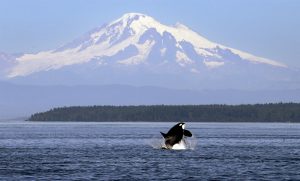Saving our orcas
The National Marine Fisheries Service (NMFS) in November of last year issued new mitigation requirements for nearshore developments — like West Bay Yards, for example. The opinion includes significant increases in mitigation necessary to protect juvenile chinook salmon and the Southern Resident Killer Whale from extinction.

The opinion, and the new mitigation framework created by NMFS, has the potential to significantly increase the cost of new projects as well as repair and maintenance projects located on or near Puget Sound shorelines. Advice from land-use attorneys is that prospective developers should be aware of these impacts as they look for opportunities on the shores of Puget Sound.
While the NMFS Biological Opinion only considered 39 projects that were under consultation between NMFS and the US Army Corps of Engineers, the Opinion forecasts that nearshore Puget Sound projects that require a federal permit can anticipate significantly greater mitigation requirements and increased project costs for compliance. They will also likely face significant delays in Endangered Species Act consultation.
For some projects, such as repair or replacement of residential bulkheads or docks, it is unclear if NMFS mitigation requirements will be economically feasible for many property owners.
This new Opinion will likely shape nearshore project engineering and planning in the Puget Sound for years to come and make new nearshore development in Puget Sound increasingly difficult. Mitigation requirements for new development are significantly greater than those for repair and maintenance projects.
Puget Sound Chinook have been listed as threatened since 1999 and show no signs of improvement. The fragility of salmon and SRKW populations in the region creates a highly sensitive ecosystem where NMFS has concluded drastic action is needed to preserve the species. The expectation is that resident orca that depend on Puget Sound Chinook will benefit along with forage fish, shellfish and other species.
Information for this article came from The National Law Review
(Feb. 27, 2021) and a story by Lorraine Loomis in Whatcom Watch. Loomis is chair of the Northwest Indian Fisheries Commission.

Be First to Comment